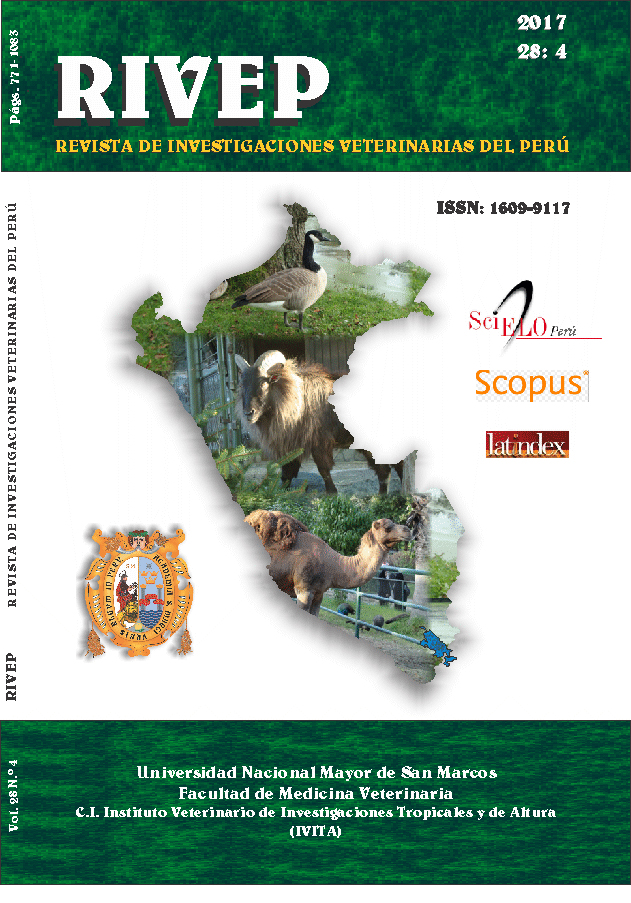Isolation and molecular detection of emerging porcine epidemic diarrhea virus strains in Lima, Peru
DOI:
https://doi.org/10.15381/rivep.v28i4.13885Keywords:
porcine epidemic diarrhea virus, PEDv, virus isolation, RT-PCR real-time, cell cultureAbstract
In 2013, clinically suggestive cases of PEDv were reported in pig farms in Lima and Arequipa, reaching up to 100% mortality in piglets and negative results to other viral agents such as classical swine fever (CPPv) and transmissible gastroenteritis (TGEv). For this reason, the aim of this study was to isolate and molecularly detect PEDv strains in Lima pig farms. A total of 37 stool samples and intestinal contents of piglets between 2 and 21 days of age with clinical signs suggestive of PEDv from pig farms of the department of Lima, Peru were collected. Results showed that 94.3% (35/37) were positive by the immunochromatography (IHC) test; 97.1% (34/35) of them were confirmed by RT-PCR real-time that amplified a 101-bp segment of the ORF3 gene of the PEDv. The control and positive samples showed a threshold cycle (Ct) between 10 and 21 cycles with a melting temperature (Tm) of 77.7 °C. There was no amplification of TGEv or PPCv used as negative controls. All positive samples were processed for isolation in the VERO-21 cell line supplemented with 20 μg/ml trypsin. The 23.5% (8/34) of the inoculated cells showed rounded shapes and lysis in cell culture between the first and second passage; however, only half (4/8) were confirmed by RT-PCR real-time. This work represents the first isolation of PEDv in Peru using IHC and confirmed by RT-PCR real-time.Downloads
Downloads
Published
Issue
Section
License
Copyright (c) 2017 Gina Castro-Sanguinetti, Mercy Ramírez V., Juan More B., Alberto Manchego S., Hermelinda Rivera G.

This work is licensed under a Creative Commons Attribution-NonCommercial-ShareAlike 4.0 International License.
AUTHORS RETAIN THEIR RIGHTS:
a. Authors retain their trade mark rights and patent, and also on any process or procedure described in the article.
b. Authors retain their right to share, copy, distribute, perform and publicly communicate their article (eg, to place their article in an institutional repository or publish it in a book), with an acknowledgment of its initial publication in the Revista de Investigaciones Veterinarias del Perú (RIVEP).
c. Authors retain theirs right to make a subsequent publication of their work, to use the article or any part thereof (eg a compilation of his papers, lecture notes, thesis, or a book), always indicating the source of publication (the originator of the work, journal, volume, number and date).










